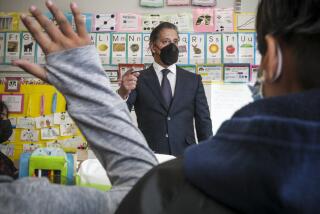Hot for teacher in Hong Kong
- Share via
HONG KONG — Angela Yiu and Stella Cheng spent weeks meeting with fashion stylists and photographers before deciding on the miniskirts and high heels to wear in their promotion campaign.
They’re not models peddling perfume or sports cars. They’re English tutors who earn good money by helping secondary school students pass Hong Kong’s grueling exams to get into college.
“Their long legs are the most beautiful ones in the tutorial industry,” said Ken Ng, head of Modern Education, one of the city’s biggest tutoring businesses. “This is our selling point.”
Sex appeal has become a selling point -- just as important as teaching ability and knowledge -- in Hong Kong’s hypercompetitive world of cram schools, or bou zap se in the local Cantonese dialect.
Attractive teachers are marketed like movie stars. Schools show them off on billboards, full-page newspaper ads and TV screens in railway stations and on buses.
Some tutors have their own teams of stylists, fashion designers and photographers, Ng said. They also have websites, where potential students can see their photos, read their online journals and download video clips of “gag moments” in class.
It’s just the latest twist in the competition to grab the business of students caught up in Hong Kong’s make-or-break exam culture. Youngsters take two college exams during their seven years in secondary school and have to pass both to get into a university.
So hoards of students trek to after-school lectures at tutoring centers.
The Census and Statistics Department says a third of secondary school youngsters sought private tutoring in the 2004-05 school year, spending $18.9 million a month -- 25% more than five years earlier.
Industry pioneers like Modern Education and King’s Glory each have about 10 centers in the city that offer about 200 lessons a week.
All the companies boast of their ability to give youngsters an edge by predicting what questions will be asked in the exams, employing teams of full-time analysts who study patterns from previous tests.
With competition becoming fierce, the tutorial centers have increasingly focused on promoting their teachers as trendy icons.
“When our rivals are equally good at predicting the exam questions, we need a new ground to outrun them,” Ng said. “And that is the tutor’s appearance.”
Last summer, Ng hired Yiu, who once won a modeling contest, to teach English with Cheng, who Ng described as “a gorgeous former lawyer.”
Yiu, who has a business degree, said, “Being a model is not a long-term career. I should plan for the future. I know my good appearance has a market.”
Indeed, tutoring can be one of the most profitable jobs in Hong Kong.
Elaine Chow, an advertising executive, said tutoring businesses were applying a “star-making” promotion technique in which tutors dressed fashionably and were given nicknames like the “Godfather of Science,” “Brand-A tutor” or the “Queen of English.”
“In the advertisements, going to tutorial centers is portrayed as a trendy after-school activity more than a chance to acquire knowledge,” she said. “This is a twisted tutoring market.”
Percy Kwok, a former education researcher at the Chinese University of Hong Kong who studied the private tutoring phenomenon in 2003, said tutorial centers closely tracked the consumption culture of youths in order to catch their attention.
“They may even expose tutors’ private lives if necessary,” he said.
He added that although tutorial centers had become highly commercialized, they provided useful techniques about exams, such as predicting question types. Regular schoolteachers don’t have comparable resources or the time to do that, he said.
Tutorial centers will continue, he said, “as long as university certificates and exam results are the best evidence to prove one’s competence and guarantee a stable income.”
More to Read
Sign up for Essential California
The most important California stories and recommendations in your inbox every morning.
You may occasionally receive promotional content from the Los Angeles Times.













